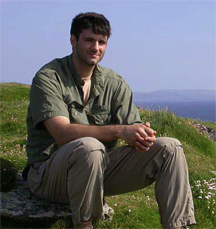
I grew up in a very small Appalachian town in eastern Pennsylvania. I received my B.S. from Muhlenberg College, a small liberal arts school in Pennsylvania, where I majored in environmental science and political science. I spent a brief period of time working for a US Congressman before deciding to return to science. I received my Master's from the Yale School of Forestry and Environmental Studies and then stayed on to complete my Ph.D with Dave Skelly. I then got the opportunity to go to Santa Barbara, California as a postdoctoral fellow at the National Center for Ecological Analysis and Synthesis. I was lucky enough to get a job in 2008 in the Ecology and Evolutionary Biology Department at the University of Connecticut.
Ever since I can remember, I spent my youth collecting insects, catching frogs and salamanders, tracking deer, writing observations on feeding birds, dissecting grasshoppers, and performing experiments in my "lab" in the basement. So I guess I always was a scientist, although now my experiments tend to be performed with much larger forethought and replication. In the end, the thing I like best about science is the independence with which I can explore whatever questions interest me.
My work generally combines some integration of community ecology, evolutionary biology and spatial ecology. I am generally concerned with the joint evolutionary and ecological mechanisms that affect the abundance and distribution of interacting species across spatial scales ranging from the local microhabitat to the geographic ranges of species.
I have always been fascinated with species interactions, especially between predators and prey, and trying to understand the complex dynamics that maintain high species diversity. Although I see myself first as a community ecologist, I increasingly incorporate an evolutionary component into my research. Understanding evolutionary processes emerged quite naturally out of my interest in explaining ecological dynamics across varying spatial scales of environmental heterogeneity. The salamander populations that I work on turn out to be differentiated across small spatial scales. Since that finding, I have become increasingly concerned that gaps exist between evolution and ecology and that by concentrating on one or the other we might be missing key processes that structure natural communities.
I enjoy travel, hiking, camping, gardening, woodworking, and playing ice hockey. However, my biggest hobbies right now are playing with my 2-year old and renovating our old farmhouse.
ASN represents to me a true integration between theory and experimentation and ecology and evolutionary biology. These integrative themes match with my own ideas about the best way to make progress in biology as a whole. It's great to have a society of colleagues that share these convictions.